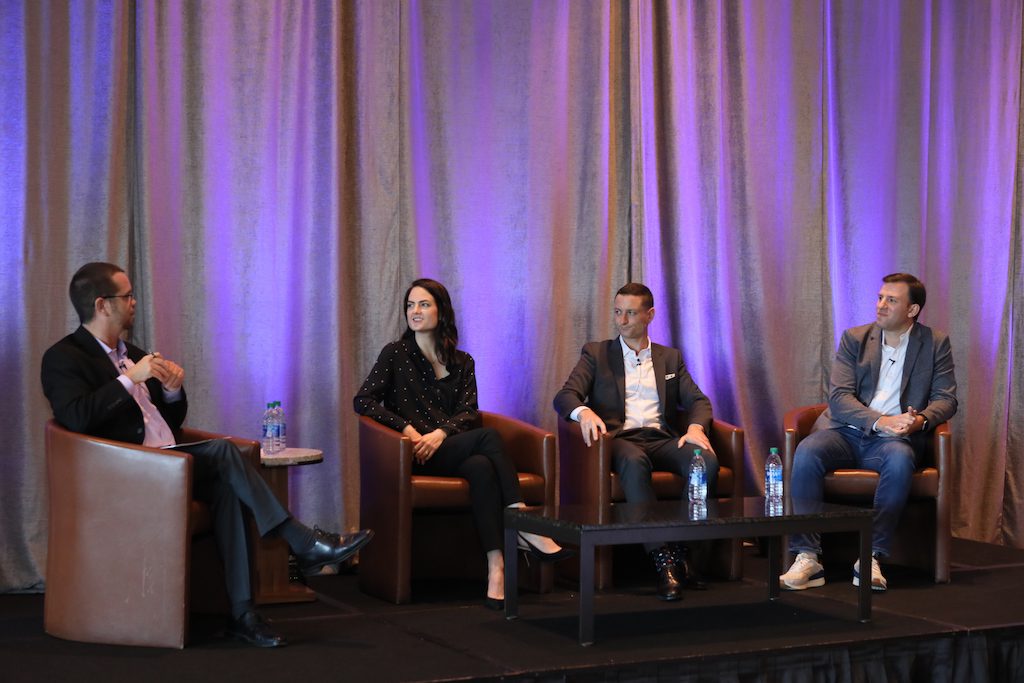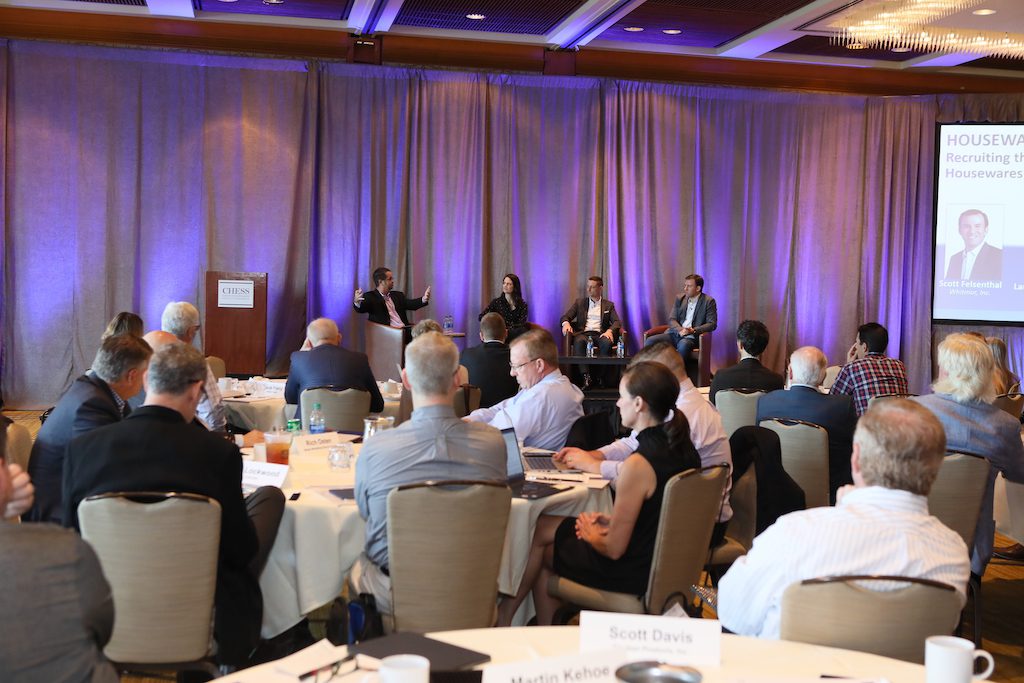Moderated by:
Peter Giannetti, Editor-in-Chief, HomeWorld Business
Panelists:
Lauren Greenwood, President/Co-Founder, YouCopia, Daniel Seehoff, CEO/Co-Founder, Sophistiplate, LLC and Scott Felsenthal, Executive Vice President, Whitmor, Inc.
In what has become a tradition since 2012, Peter Giannetti, the trade journalist with his finger on the pulse of the housewares industry, engaged IHA member panelists in Housewares Hot Seat, a conversation about issues from the front lines. This year’s guests were three young leaders who addressed the challenges of attracting young talent to this industry.
Giannetti began by commenting on this year’s CHESS theme: Building for the Future… New Leaders, New Markets. “Our industry is at a tipping point as it looks to the future. It must engage, attract, recruit and retain young talent so new hires don’t leave in four months. We have to show them that this is an industry they can sink teeth into.”
He introduced the panelists and asked them to describe their roles and company operations.
Lauren Greenwood co-founded YouCopia with her father, Mark Greenwood; Daniel Seehoff co-founded Sophistiplate with his father, Gary Seehoff; and Scott Felsenthal, who rose to executive vice president at Whitmor after 10 years of working alongside his father, Peter.

Greenwood: We change the way people feel at home by using YouCopia’s innovative, adjustable storage products. YouCopia products allow users to organize a spot in their home and feel good about the experience and their pantry. Twelve years ago, just the two of us did everything. As we grew, we needed to add staff. Manufacturing is done in China and our office in Chicago handles product development, marketing and other operations. We have seven full time employees and three contract workers. Our small group of YouCopians is high functioning and healthy. My #1 job after six years in this role is building and managing the healthy team.
Seehoff: Sophistiplate aims to disrupt the market for single-use party and entertaining items. Products are unique, design forward and Instagrammable. Business is challenging today. My dad and I started the company four years ago. Our products are made in China. It’s tough to gain distribution now during a huge shift in retail distribution and into the headwinds of tariffs.
Felsenthal: Whitmor is a four-generation family business in the home storage and organization market. It was founded in 1946. I work with my dad, uncles and other family members and began coming to work with my dad when I was a kid. We now have 120 employees, so it’s an interesting dynamic of generations.
Giannetti: Considering today’s business climate, and with the shift to digital commerce, it’s important to get people into an organization who are early adopters of ideas and new approaches.
Perceptions of the Housewares Industry
Giannetti: What do young people think of the housewares industry?
Seehoff: It’s shocking to me how little the millennial cohort knows about us. Of the people I talk to, 95% think housewares is a stagnant business and it doesn’t apply to them, like selling fine china to our grandmothers. Looking at it through an entrepreneurial lens has them thinking it hasn’t been disrupted like other industries. They would rather start something themselves than join a company.
Felsenthal: We have to project to a prospective employee that this is not an old-fashioned business. We tell the new people it’s about the product that gets into people’s homes to change their lives. Technology is a natural for the younger generation. Watching younger employees train older ones is a fascinating dynamic. The 75-to 80-year-olds blend with the 18-year-olds. When we create the best workplace we can for all groups, we have the greatest probability of success.
Hiring and Building a Creative Team
Giannetti: Are you all involved in hiring decisions?
Greenwood: Yes, I handle all interviewing and hiring. I try to drive a culture that is appealing so that they will want to work for us. We need their opinions to drive product development and marketing. Internally, a younger employee was after me for months to try the new Microsoft Teams application. Once we tried it, it took a week to get addicted to its capabilities. Be prepared for the next generation of consumers and employees and reflect their values.
Giannetti:
We hear that clear communication, transparency, autonomy, empowerment,
incentives beyond money, recognition of achievement, feedback, adaptability,
innovation and team building are what millennials want in the workplace. How do you achieve all this?
Greenwood: Young people are not aliens. They are motivated by same things the rest of us are. Everyone wants to be trusted and aligned with goals. That’s just good management. Yes, millennials want feedback and transparency. We need to make sure everyone understands why we are doing what we are doing. It’s important that they feel like they own a piece of the success and it’s not just 9 to 5 thing, or else they will look for another job. They are exposed to friends—their peers—who have glamorous jobs with perks and travel. They want something to be proud of; they want to be learning and making a difference in the company.
Seehoff: I read that 60% of millennials would prefer to start their own company than climb the ladder in an existing company. Show new employees that the entrepreneurial ethos is important. We have to show them that they can own a part of the process in product development, logistics or whatever, and this way they don’t have to take on the risk of starting their own company.
Felsenthal: We give departments and employees the freedom to be creative. We empower them to offer ideas for new products and drive the entrepreneurial spirit.
Reviews and Relationships
Giannetti: How do you include innovation and redefine what the work truly is in your review process?
Felsenthal: As we assess the way we recruit and retain employees, we see that the most critical relationship is between younger employees and their direct managers. Employees who have conflict with their managers are likely to leave the company. There are pros and cons on the review process. We think annual reviews are silly, they should be happening every week. If the managers care about the employees, they will want to see them grow. Tighter connections are crucial.
Seehoff: We give employees a chance to prove themselves. We come together quarterly to realign with the company goals for the future time period. We foster a culture that invites people to come forward with ideas for new products, a new customer to go after and to get excited together about getting to the goals.
Greenwood: It’s important to communicate goals and performance expectations in the feedback. You have to care about the employee and communicate that. The most powerful words are “I trust you.” We don’t say that enough in our actions and words. When we communicate openly, we can course correct with the employee and make progress.

Workforce Futures
Giannetti: What do millennials think the industry thinks of them?
Felsenthal: In my 10 years with Whitmor, I see that every industry is driven by relationships. Ours maybe more than others, since through our relationships with our customers we reach consumers. Sometimes there is a reluctance by the older generation to delegate or relinquish relationships, and that has to happen as we move to the next leaders.
Seehoff: It’s essential to recruit the next generation since they will be 75% of workforce by 2025. We need their perspectives to reach the next wave of consumers. Whether changing product or process, change has to happen.
Greenwood: I think housewares is doing a good job. I see it in the new name of the Show, The Inspired Home Show, and the IHA’s Young Professionals Council, YPAC, to get young people into the industry. New ideas and new brands are being launched all the time. We need to continue to state our purpose and use the social-driven wants of the younger generation who are part of the environmental movement. As they form households and marry, we will see more interaction with our industry.
Felsenthal: We celebrate anniversaries. We recently celebrated someone for her 55th year; she was hired when she was 20 years old. Maybe one of our younger employees will see that and think, “Why can’t I be that next person?” If they develop a career mindset, they will stay as long as it makes sense.
Giannetti: For years, when I’d get a resume that showed 10 stops in five years, I’d toss it to the side. I’ve had to unlearn my bias to evaluate candidates differently when I hire, knowing that this job might not be their last stop.
Giannetti invited the audience to ask questions and a lively exchange followed. Questions included discussions on loyalty, generational stereotypes, attracting employees to locations that are not urban hubs, telecommuting/working from home policies, how much company financial information is shared with employees who are not family members, and practices for successful interviews and reviews.



